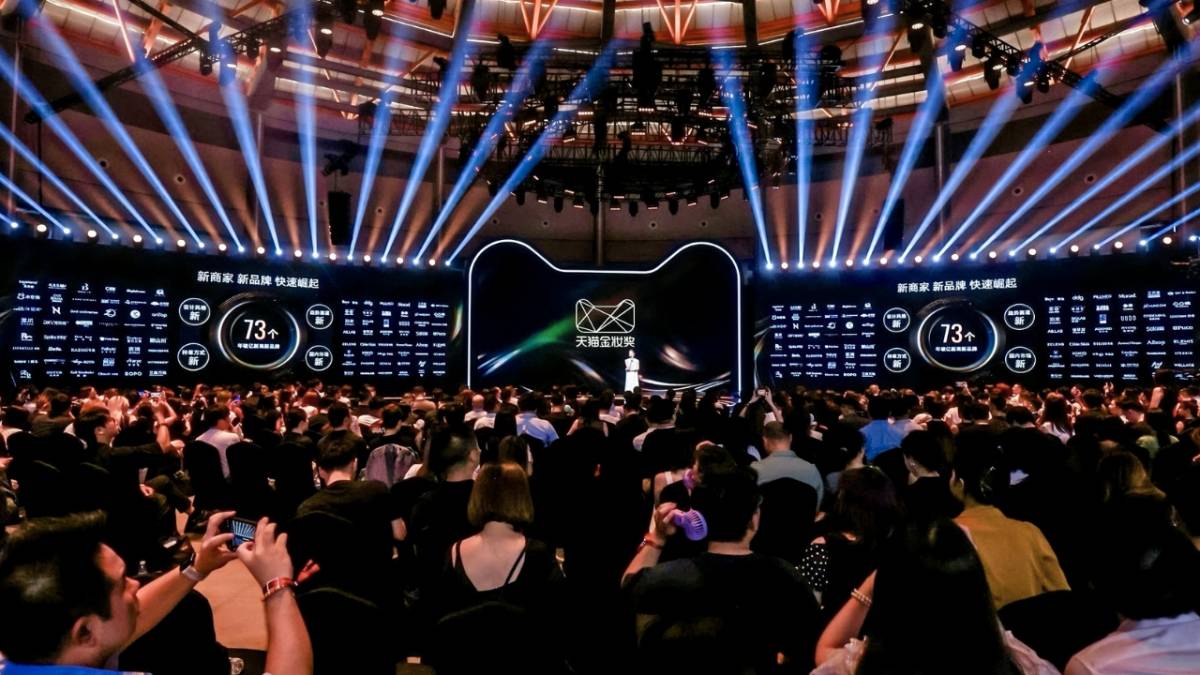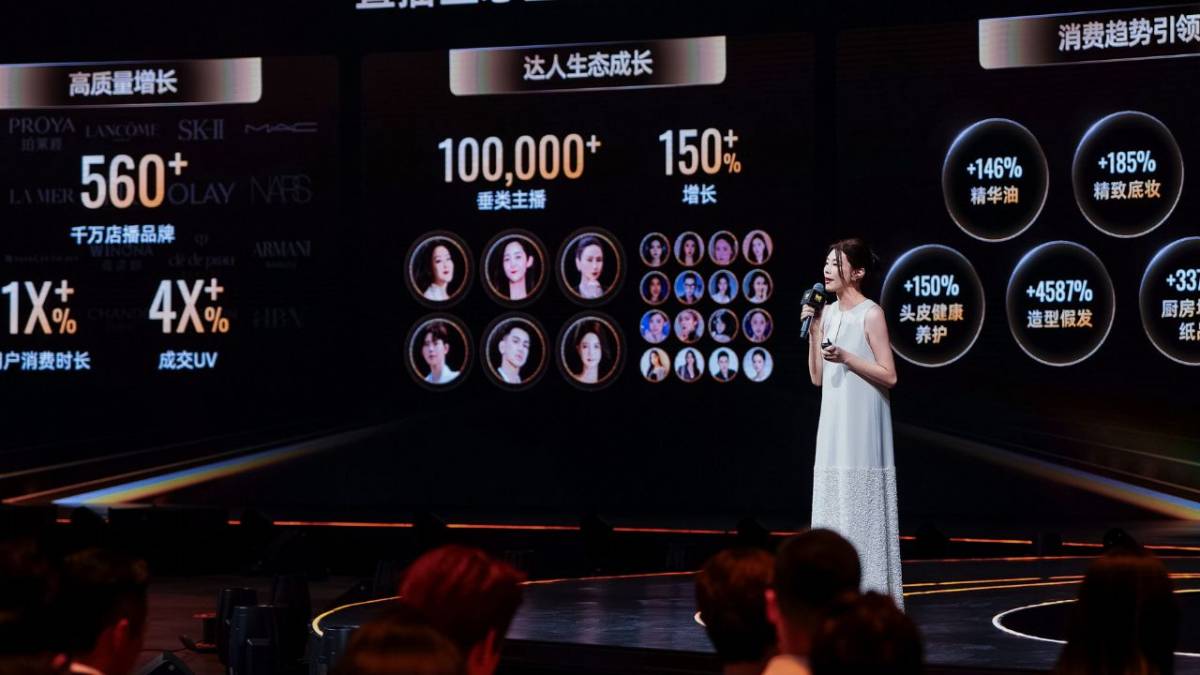
This week, B2C e-commerce platform Tmall held its 10th annual Beauty Awards in Shanghai to recognize the category’s top brands and products from the last decade.
In other news, Alibaba Cloud released a version of its Qwen large language model with enhanced audio abilities, and the cloud computing company announced plans to build an AI-powered application for Shiseido-owned skincare brand Drunk Elephant.
Tmall Crowns Beauty Winners, Reports Livestreaming Growth
Tmall held the 2024 Beauty Awards earlier this week to celebrate brand achievements in the beauty sector and share the growth of its beauty-focused livestreaming channels.
According to Tmall, twice as many brands participated in this year’s awards as last year, as their representatives gathered in Shanghai for an evening of festivities and to hear insights from platform executives.
“The consumer market is rapidly iterating. Beauty brands need to keep pace with the times and persist in creating long-term value for consumers,” Mu Shan, General Manager of FMCG at Taobao and Tmall Group, told the audience.

Over the last year, Tmall has sought to seed innovation within the beauty category by producing more than 500 livestreaming channels in collaboration with established and up-and-coming streaming hosts.
So far this year, the platform has cooperated with more than 100,000 KOL livestreamers—a 150% year-on-year increase.
Alibaba Cloud Launches Qwen2-Audio Model to Analyze Speech and Audio
Alibaba Cloud’s open-sourced Qwen2-Audio is the latest iteration of its large audio language model (LLM) that can process audio and text input and generate text output.
The LLM is capable of understanding more than 8 languages and dialects, such as Mandarin, Cantonese, English, French, Italian, Spanish, German, and Japanese.
Trained on an expanded data volume, Qwen2-Audio can achieve seamless voice and text interactions with users to perform voice chat and audio analysis tasks. The model can transcribe speeches and identify audio information from across a wide range of sounds, including spoken words, music and ambient noises.
Qwen2-Audio achieves state-of-the-art performance in tests focused on audio-centric instruction-following capabilities.
Since many previous test datasets are highly limited and cannot adequately reflect performance in real-world scenarios, the Qwen team also launched a benchmark designed to evaluate the ability of large audio language models to understand various types of audio signals.
At the 62nd Annual Meeting of the Association for Computational Linguistics (ACL 2024) hosted in Thailand last week, the study on benchmarking large audio-language models from the Qwen team was accepted as the main conference paper to be presented during the annual meeting.
In total, 38 papers from Alibaba Cloud were accepted by ACL 2024, the premiere conference for natural language research.
Shiseido China Taps Alibaba Cloud’s Qwen to Build Skincare Assistant
This week, Drunk Elephant, a skincare brand under Japanese beauty company Shiseido, said it is partnering up with Alibaba Cloud to develop an AI-powered application that can respond to customer inquiries and provide personalized skincare advice.
Powered by Alibaba Cloud’s LLM Qwen, the customer chatbot is trained on the brand’s knowledge database and optimized with Alibaba Cloud’s AI services to enhance accuracy and relevancy.
Consumers can tap the skincare assistant to address all their inquiries, from product recommendations to personalized skincare tips.
Leveraging Alibaba Cloud’s automatic speech recognition and text-to-speech technologies, they can interact with the AI assistant through text or voice chat and have the skincare assistant provide instant responses in both text and voice formats via Drunk Elephant’s mini-program.
“We are pleased to tap into the transformative power of Alibaba Cloud’s AI to bring skincare retailing to another level. We believe that this collaboration with Alibaba Cloud will help us further grow our brand value and better engage with our tech-savvy young consumers,” said Andy Cai, Brand Director of Drunk Elephant China.
Since 2016, Shiseido China has leveraged Alibaba Cloud’s cloud-native applications, edge computing and security services to support its business growth in China.

“Black Myth: Wukong” Sparks Video Gaming Surge and Tourism Bookings in China
A myth-laced video game that brings China’s ancient legends to life is also driving consumer activity across the country, according to data from Alibaba Group’s e-commerce and travel platforms.
Taobao saw a 130% increase in overall video game sales on the day the game was released compared to the previous Tuesday, while searches for the title jumped nearly 14-fold.
Buoyed by the upswell in interest for all things gaming-related, Tmall’s home game consoles category reported an 80% year-on-year increase in sales.
Q&A: How Alibaba’s DAMO Academy Uses AI to Improve Solar and Wind Energy Forecasting in China
As the world shifts toward greener energy sources, the renewable energy sector is poised for major growth – and fresh challenges.
Wind and solar power sources are vulnerable to extreme weather conditions, putting energy management systems under increasing pressure and stretching traditional forecasting methods to their limits.
To learn about how AI technology could solve these problems, Alizila spoke with Liu Le, senior product expert of DAMO’s Decision Intelligence Lab.

5 Ways Alibaba’s Technology Elevated Olympic Viewing, Dazzled Spectators at Paris 2024
The Olympic Games Paris 2024 drew to a close earlier this week, but we’re still buzzing about what Alibaba Group’s cloud and artificial intelligence technology achieved inside and outside the sporting arenas.
Over 19 days of competition, Alibaba’s innovations helped make Olympic history and engage spectators near and far with the spirit of the Games.




